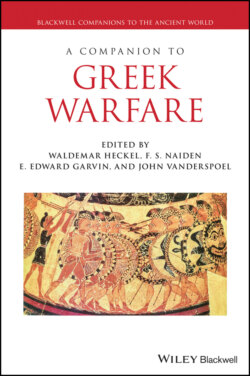Читать книгу A Companion to Greek Warfare - Группа авторов - Страница 52
Greeks and Indigenous Peoples Upon arrival
ОглавлениеScholars long depicted Greek occupation of Sicily as primarily offensive and unilateral, whereas recent research has emphasized the role of native communities. It remains that Greek colonization was accompanied by violence, forced evictions, and territorial appropriation. Thucydides (6.3) recounts the expulsion of local inhabitants during the foundations of Naxos (734), Syracuse (733), and Leontini (728), and excavations at these sites reveal Iron-Age structures summarily removed to create space for townscapes. Violent encounters likely occurred after the foundation of Gela in 688. Although Gela was not constructed upon an earlier settlement, the earliest Geloans apparently sacked the town of Omphace in the foothills of the Geloan chora (Paus. 8.46.2).
The non-Greek communities concurrently developing in the hinterland were soon drawn into the sphere of influence of their new neighbors, thanks to trade, treaties, and shared rituals. For example, Thucydides (6.4) describes an agreement between Greek settlers and a local potentate during the foundation of Megara Hyblaea in 729. A group of men from Megara had suffered several misfortunes while searching for a permanent settlement area, when the Sicel leader Hyblon offered them a site on the eastern shore of Sicily, where they founded their city with the approval of the local people.
Although this story points to varied relations between Greek settlers and their neighbors, it also demonstrates that Greek enterprises in Sicily were not automatically successful. In 580, the expedition of Pentathlus of Cnidus to Lilybaeum utterly failed after the settlers became involved in a local power struggle (Diod. Sic. 5.9). At the end of the century, when the Carthaginians had already staked their claim in western Sicily, the Spartan Dorieus and his men also met fierce resistance while settling this area.2 Colonization was risky as well as complex. Nevertheless, many of these early conflicts can be interpreted as raids or skirmishes—false starts with few casualties.3
